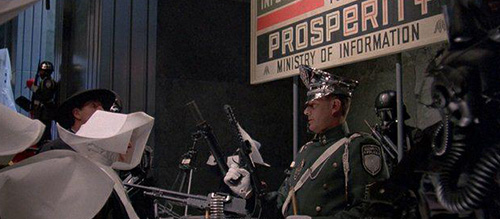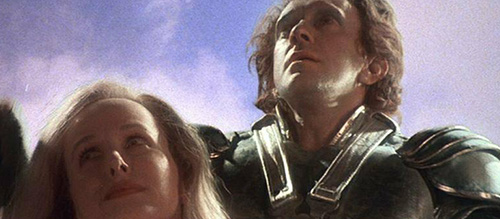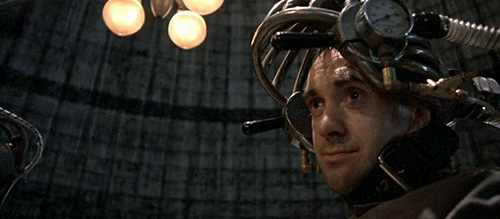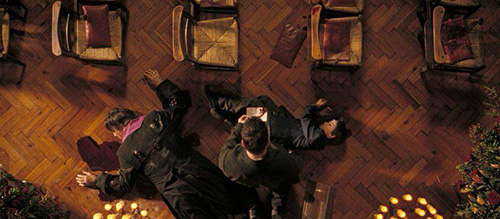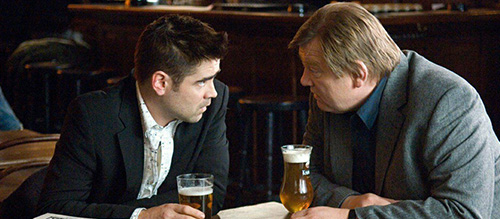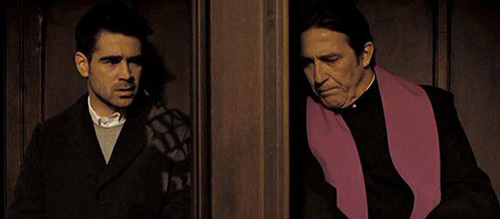Katie Doyle’s ‘Movies I Had A Religious/Spiritual Experience With’ Part 3
If you’ve read part 1, 2 and 2.5 of this Movies I Had a Religious/Spiritual Experience With series, then you know the drill: this is a deep walk into my own psyche and contains some in-depth analysis, so… “Spoiler” alert.
Please prepare for some heavy theological discussion.
Brazil (1985)
So far, all the movies that I have discussed as part of this series have all led to somewhat joyful experiences. Each of them have, in some way, led me to reflect upon all that is good in this world; the awesomeness of creation, the mystery of what it means to be human and our inherent goodness. However, in almost all religions, there is the recognition of evil in this world that poses a real threat of infecting and consuming the hearts of people, and it is also believed that it is very easy to succumb to this path unless we remain vigilant.
It has often been the films that focus on the darker parts of the human condition that I have found to have an incredible transforming power. One such movie is Brazil, directed by Terry Gilliam. In my religious series, this is the film which has provoked the most visceral reaction from me upon viewing it.
On one dreary, overcast, miserable day, a man sits alone on some squalid English beach determined to enjoy himself as the instantly recognisable notes of “Aquarela do Brasil” float from his radio. This was Terry Gilliam’s inspiration for the name of this movie, set “Somewhere in the 20th century”.
In a 2015 article – Brazil (1985): A Cut Above the Rest – I tagged this film as a dystopian comedy. I realise it may seem a bit much to label a comedy as being a profound spiritual experience, but bear with me as I believe the laughter really does lend itself to the powerful message of the film, and uses such to set itself apart from its contemporaries.
In the movie, the hero is mild-mannered clerk Sam Lowry who lives in some grey concrete cesspit straight out of a George Orwell novel; a world of soulless occupations, small-minded bureaucracy, and never ending “terrorist attacks”. Oh gosh, that sounds rather familiar, doesn’t it? Well that’s why this film is such a killer. Apart from the likes of 1984, Brave New World and The Hunger Games which conjure up improbable worst case scenarios, Brazil is simply a reflection of real life. The farcical routines that Sam Lowry finds himself in enforces its realism, as it can’t help but remind you of all those ridiculous situations that only to happen to us on the worst days of our lives – with which significant distance helps you to eventually learn to laugh at over time. Through our laughter at the slapstick and vitriolic wit, we connect to Sam and see ourselves in this every man, but this empathy ends up being a bitter pill to swallow as it can’t help but to make us have a hard and unflattering look at our own lives.
The story’s crux is based on an injustice served to a character without a single line, Mr Buttle. A squashed bug in a printer leads to an administrative error in which the nobody cobbler is mistaken for heating engineer come suspected terrorist, Tuttle. A simple and pleasant family evening, with all the children excited for Christmas, becomes a Gestapo-like nightmare with poor daddy cuffed, clamped and spirited away to unspeakable torture which eventually kills him. They were using Tuttle’s file so how were they to know that Buttle had a heart defect? And you see, because you have to pay for your own information extraction, the ministry is left with the dreadful pickle of refunding the dead man for his trouble over this little misunderstanding. True to all real bureaucracies, the little embarrassing issue of the receipt of compensation is simply passed from department to department, no one willing to deal with it. This is where Sam, the talented clerk with his savvy touch in committing minor fraud, comes in.
Now, in my previous work I have identified Sam Lowry as the hero of Brazil, with the ruling ministries of his world as the villain of the piece. The Ministry of Information with all its pawns and faces such as Deputy Minister, Mr Helpman, and callous torturer Jack Lint, embody the evil recognisable in the contemporary systems of power in the 20th and 21st centuries. Recognisable evil that spans from the more menacing aspects of the Nazi regime and Stalinist Russia in which any non-conformists are locked up and destroyed, to the more incompetent like the abundance of obsolete departments overlapping each other, leading to daily drudgery for the poorest in society. Funnily enough the super-rich and powerful do alright, which is again spookily familiar, but something I’ve overlooked up until very recently is that Lowry himself is also a complacent little cog in this horrible government. He has found his own happy little niche of mediocrity which gives him the perfect protection of insignificance. He sits disinterested in the face of devastating terrorist attacks, intent on finishing his lunch instead, and stands in embarrassment as a recently widowed woman falls into a ghastly breakdown over the fate of her husband’s body. He’s a bit of a pathetic prick really.
It is evident that Sam’s aspiration transcends this Orwellian-Gilliamian nightmare through his desires of heroism and companionship. But to be harsh, everyone has dreams like this, and it doesn’t make Sam any more virtuous than his neighbour. Unless you do anything about these internal musings, they don’t define you as a person. In all brutal honesty, it is what you do in life that actually counts. These are thoughts that have come from my own self-reflection. Like Sam, I spend a good portion of my own free time indulging in dreams and fantasies, and I have felt frustrated that I have gotten nowhere in these fanciful aspirations. I know this is because I am wasting my time ruminating rather than doing anything about it, and with this jarring reflection to my own life, I have only recently come to understand part of my visceral reaction to this movie. It seems Sam’s transformation must have always given me a trickle of hope.
During Sam’s trip to get rid of the ministry’s embarrassing accounting anomaly, the impossible happens and he stumbles upon the literal woman on his dreams. This personification of Lowry’s fantasy is the poor, hardy truck driver Jill, who has been trying to help her downstairs neighbour Mrs Buttle get justice for her missing husband. Sam knows immediately he has to get close to Jill. Yes, it is for his own selfish purposes at first, but his mission brings him out of his shell, becoming the brave figure of his own imagination. Jill’s fierce sense of justice pricks Sam’s own conscience as he sees beyond his own life and becomes aware of the suffering around him. Corny as it is, it is love that turns Sam into a hero – desperate to save Jill’s life, he puts himself in unspeakable danger without a thought, taking on the very despicable workings of the ministry itself. Sam truly lives in the way I want to live: fearless in the face of evil for the sake of love.
Admittedly, this would all be meaningless schmaltz if it were not for possibly the most powerful ending I have ever seen in cinema. The first selfless actions of Sam Lowry’s life don’t go unnoticed, and he too is captured like Buttle and bundled away to excruciatingly painful and expensive torture, provided by his old chum Jack. For a moment we think love prevails via a Robert De Niro shaped Deus Ex Machina, but alas, it is but his mind providing one last reverie as it finally snaps under Jack’s deft handiwork. I remember watching the credits roll to Sam’s murmurs of “Aquarela do Brasil” in a state of shock. How could they!? I finally understood. Unlike Universal’s inferior edit, Love Does not Conquer All, but being able to recognise the evil of the movie in my own life, it is much better to live briefly fighting for the sake of love and humanity than to face a lifetime of misery by allowing my soul become consumed by the system which, to quote Charlie Chaplin, “makes men torture and imprison innocent people”.
In Bruges (2008)
Well, look here, Ralph Fiennes has managed to make a third appearance in this religious series; how odd. I don’t even know where to start with this though, and I feel like I’m going to do the movie a massive injustice but here I go anyway. A film of teeth clashing contradictions being the most irreverently offensive examination of morality committed to cinema; the funniest tragedy and the most tragic comedy I have ever seen. The debut feature length flick of writer/director Martin McDonagh heralded the start of an auspicious career in Hollywood, resulting in one of this year’s most highly acclaimed Oscar nominees, Three Billboards Outside Ebbing, Missouri. Amazing his turn in America has been with the likes of the brilliant Seven Psychopaths, his more modest and decidedly Irish/British outing holds a very special place in my heart and those of many of my generation.
Perpetually bored yet deeply troubled townie hitman Ray (Farrell) is aghast when he and his partner Ken (Gleeson) are sent by their mob boss Harry (Fiennes) to Bruges – a sleepy but enchanting little town in Belgium – after a job gone wrong. A thoroughly modern gentleman, Ray is not content in seeing the many beautiful sights of Bruges, and instead wreaks havoc upon locals and tourists alike by the means of cocaine, midgets, botched muggings and vengeance in the name of John Lennon. Now I don’t know if any of you saw the trailer when it was first out, but it looked like a riotous action movie with sprinklings of dark humour – a kind of European buddy movie. However, upon watching it I was shocked to instead find a deeply moving and personal piece on man’s pain and guilt, for you see the infamous botched job isn’t just a case of a hitman getting sloppy: Ray has accidentally murdered a little boy.
I am still in such disbelief that this was McDonagh’s first feature length film as it is a work of pure genius on many levels but most evidently in his meticulous orchestration. The first 15 to 20 minutes cover Ken’s and Ray’s impromptu arrival in Bruges, comprising of stunning scenery filled with cutting remarks and insults between the pair (and the occasional unfortunate bystander) which leave you doing ugly snorts of laughter.
“Maybe if I grew up on a farm and was r*traded…”
“You’s a bunch of f*ckin’ elephants!”
“One gay beer for my gay friend…”
Brendan Gleeson’s and Colin Farrell’s remarkably believable performances during these squabbles produces comedy gold. The more mature Ken’s increasingly futile attempts to enjoy culture perfectly matches with Ray’s ignorant resistance to the place, his summing up of history as “…a load of stuff that’s already happened” being the perfect soundbite of his contradicting opinion. The pinnacle of this is Ken’s barely restrained furious exasperation at Ray’s reaction to the chance touching a vial of Christ’s blood as a chore:
“Do you have to?! Of course you don’t have to! It’s Jesus’ f*cking blood, isn’t it! Of course you don’t f*cking have to! OF COURSE YOU DON’T F*CKING HAVE TO!”
It is quite impossible to not love the both of them, as it is hard to see Ken and Ray as made-up people, the genuine laughter summoned by Mcdonagh’s witty script forges a true affection for these characters. So, the reveal of the murder of the little boy awaiting confession in his local Catholic church literally wrenches the air from your body. It was the first time in my life I felt genuine ambivalence – I had spent about 20 minutes laughing my arse off beforehand and now I wanted to cry and throw up.
Along with putting his audience through excruciating emotional athletics, McDonagh seems intent on smashing up cinematic conventions (which he does in a very Meta manner in his next film Seven Psychopaths). Hitmen in Hollywood are cold-blooded, ruthless brutes, detached and lacking any links with humanity. It is also not a Tinsel town norm to show a kid getting blown away by an assassin. However, these deviations from established movie-making norms is not just for the sake of it or to be an “edgy individual”, it is to help McDonagh underline his point; a message so important to him he has been compelled to make a movie about it. With the barest look at the surface, you could say that Ken and Ray are not good people: they kill people for money. However, if you dig even further, you see that they are still both quite terrible. Murdered lollipop men, women punched in the face, drugs stolen, and rude things said to Americans all stand against their character. Taking the comedy aside, the business and world they live in is undeniably a dark path. In a religious sense they have sinned, murdered, broken a commandment – acts which can be held against them on the day of judgement, the idea of which looms over the both of them: heaven, hell or the “inbetweeny one”, purgatory.
Still, within a religious sense – specifically Catholicism with which there are obvious nods to in the film – to label Ken and Ray as irredeemably evil would be completely untrue. Ken’s genuine enjoyment of Bruges shows an appreciation for the beautiful things in life, and it proves that this love of life goes beyond the superficial delights of the senses and into a deep reverence for life itself. His disgust at Jimmy’s racism (the aforementioned dwarf) during his coke-fuelled rants, shows the pain of a man who had tried to be good, as it is revealed Ken’s wife who was black was murdered by a white man. In good conscience, he cannot let casual offences slide – easy to slip-in racism is what killed his wife. Furthermore, the friendship, respect and honour he feels for Harry, whom he has indebted his life to, cannot be argued with when you can plainly see it in Ken’s pain at his admittance of his own betrayal to Harry. Yet even the power of this enormous betrayal does not damn him as it is an act of mercy, one of the rarest yet sweetest virtues, mercy for a man who needs it the most: Ray. Yes, offensively boorish, terrifyingly violent, child-murdering Ray. Yes, Ray who physically cannot stop weeping over what he has done, who can’t stop thinking of what ifs, Ray who is close to taking his own life as he can’t live with what he has done.
In Bruges is essentially a story of mercy and humanity’s desperate need for it, and through the art of humour it succeeds in convincing us to be kinder people, to use the choices we are given to harvest goodness out of a terrible situation. Now I am going to let you into a little secret: throughout my spiritual series, many of the conclusions I have made about the movies featured aren’t usually my immediate thoughts after seeing them, but what they all do have in common is that they are all incredibly beautifully made films that have all succeeded to produce a visceral reaction in myself of awe, shock or elation. As these emotions calm I usually know that I want to be a better person; it’s only when I actually sit down to discuss (or write about) why I like these movies that I actually discern the subtle messages left within. In Bruges in this case is very special to me as it taps into what I have learned about faith through Catholicism, which Martin McDonagh experienced too (although he has departed from the faith over the years).
The movie’s Confessional scene is the most important in the movie in terms of its message. The Sacrament of Reconciliation as it is known, is one of the most feared acts for those brought up Catholic – brought into a small space, thankfully usually hidden from the priest, you proceed to confess all your failings as a person; the ones which you are truly sorry for, so that you can then be absolved from these transgressions, usually by doing a penance. Despite it being the most hated sacrament, it is one of the most beautiful – it makes you a part of God’s inconceivable plan in creation, it reveals the mystery of what is to be human; that you are a precious treasure, irreplaceable in God’s eyes. God made man in the image of himself – humans have knowledge of good and evil Q.E.D. But God loving his creation gave us free will, so that if we loved him in return, it would be through our own choice and would be a pure unadulterated love. However, the choice to sin is often seductive and we choose to hurt other people, for example by hiring people to kill for money. Because of free will, we would have to pay the consequences for these bad choices – in the ancient Jewish faith in which temple in Jerusalem was an extremely important part, atonement was searched for from God via burnt offerings of sacrificed animals. However, according to Christian doctrine, these sacrifices were simply not enough to make up for the terrible things humans have done to each other, and God knew that the price was our own lives. But as he loved us, he couldn’t abandon us to this fate and took it upon himself to become a human. Jesus Christ was the perfect sacrificial victim for he was a man completely without sin, so through dying and then rising from the dead, doctrine dictates he released us from the burden of our sins. He forgave us for everything we did, even when it meant his own body would be broken and blood spilt. The act of Confession gives a Catholic the chance to experience this forgiveness as our sins are literally absolved and we are given a fresh slate, the opportunity to start anew. It is the opportunity to go relive the moment marked by our Baptism – release from our chains of sin.
Words can’t describe Ray’s understanding of the evil he has committed through his own free will. He is all too aware that the decisions he has made in life have robbed a little boy of his own. He knows he must pay and at one point he believes the price is his own life. But Ray falls a victim to mercy. Ken knows he can change and can still do good in this world. Chloe, the local he meets, offers mercy in the form of affection that could become love, even though she knows he might not deserve it. It is after these small acts of mercy that Ray transforms and becomes a source of goodness in Bruges, stopping innocents from being caught in a gun fight and even trying to save Harry in the aftermath of Harry attempting to murder him. Ray begins to realise he can be saved and feels the want to live again. But true to Catholic tradition, penance is served. Purgatory is not necessarily the middle place – it is a place of waiting, to carry out penance to finally make you fit for heaven. He mistakes Bruges for hell, but it is purgatory, a place of testing. Ray shows mercy and thus he will be saved.
[Author’s note – In Bruges offers a rich source for theological discussion and there are several things I have had to skip over or else this would be probably be a million words long.]


